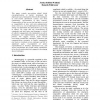Free Online Productivity Tools
i2Speak
i2Symbol
i2OCR
iTex2Img
iWeb2Print
iWeb2Shot
i2Type
iPdf2Split
iPdf2Merge
i2Bopomofo
i2Arabic
i2Style
i2Image
i2PDF
iLatex2Rtf
Sci2ools
HICSS
2009
IEEE
2009
IEEE
Local-Global: Reconciling Mismatched Ontologies in Development Information Systems
This paper extends pre-existing digital divide conceptualizations to further investigate the important issue of mismatches between the ontologies of state-created information systems and local communities’ representation of their contexts. Comparability of data across time and place, as well as compatibility of data with state administrative needs come at a cost of information loss about the setting and individuals that policymakers are trying to impact. We argue that the reconciliation of community and state logics and framings is critical for effective engagement with communities as well as formulation and implementation of development policies. We suggest several paths toward overcoming mismatched ontologies: education and communications strategies to enable communities and states to translate across ontologies and fill in significant gaps; re-assignment of policy responsibilities to minimize information loss; and several mechanisms that would enable communities to be directly an...
Biometrics | HICSS 2009 | Information Loss | Ontologies | Pre-existing Digital Divide | System Sciences |
| Added | 19 May 2010 |
| Updated | 19 May 2010 |
| Type | Conference |
| Year | 2009 |
| Where | HICSS |
| Authors | Jessica Seddon Wallack, Ramesh Srinivasan |
Comments (0)

